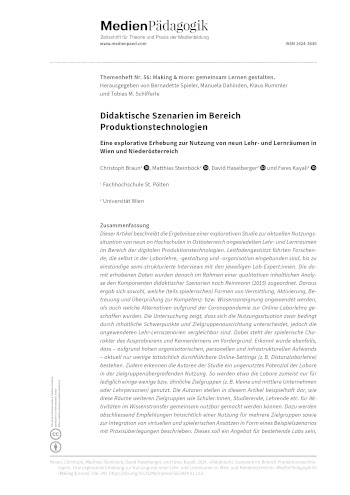Abstract
This article presents the results of an explorative study of the current situation to the usage of nine teaching and learning spaces located at universities in the East of Austria in the field of digital production technologies. Researchers who are themselves involved in laboratory teaching, design and organization conducted up to one-hour semi-structured interviews with the respective lab experts. The data collected this way were then assigned to the components of didactical scenarios according to Reinmann (2015). The outcomes showed which (partly playful) forms of transfer, activation, support, and assessment are used for the gaining competence and knowledge, as well as which possibilities were created for online laboratory teaching due to the corona pandemic. The study shows that although the premises differ in terms of content and target group orientation, the teaching-learning scenarios used are comparable. The playful character of playing and trying out is emphasized. It was also recognized that due to high organizational, personnel and infrastructural challenges, there are currently only few actually feasible online settings (e.g., distance laboratory teaching). In addition, the authors of the study recognize an untapped potential of the laboratories in the target group-oriented use. For example, laboratories are usually used for a few or similar target groups (e. g., small and medium-sized enterprises or teachers). In this article, the authors present how these spaces could be used for other target groups such as pupils, students, teachers, etc. for knowledge transfer activities. For this purpose, final recommendations regarding usage for several target groups, as well as for the integration of virtual and playful approaches, are described in the form of an example scenario with practical considerations. The article should be an offer to existing labs to consider more heterogeneous learning groups and provide the basis for further empirical investigations regarding the applicability of the practical example scenario for more diverse groups.
References
Assaf, Dorit, Josef Buchner, und Andreas Jud. 2019. «Evaluating a Makerspace Visiting Program for Schools at a University of Teacher Education». In Proceedings of the FabLearn Europe 2019 Conference, 1–3. Oulu Finland: ACM. https://doi.org/10.1145/3335055.3335057.
Blikstein, Paulo, Sylvia Libow Martinez, Heather Allen Pang, und Kevin Jarrett FabLearn Fellows Initiative. 2019. Meaningful Making 2: Projects and Inspirations for Fab Labs & Makerspaces.
Bockermann, Iris, Jan Borchers, Anke Brocker, Marcel Lahaye, Antje Moebus, Stefan Neudecker, Oliver Stickel, et al. 2021. Handbuch Fab Labs: Einrichtung, Finanzierung, Betrieb, Forschung & Lehre. Bonn: bombini.
Bohne, Rene. 2013. «Machines for Personal Fabrication». In FabLab: Of Machines, Makers and Inventors, herausgegeben von Julia Walter-Herrmann und Corinne Büching, 163–72. Cultural and Media Studies. Bielefeld: transcript.
Braun, Christoph. 2021. «Projekt Lab4home Praxisbeispiele zur Gestaltung von Distanz-Laborlehre». In Bildung in der digitalen Transformation, herausgegeben von Heinz-Werner Wollersheim, Marios Karapanos, und Norbert Pengel, 155–60. Medien in der Wissenschaft. Leipzig: Waxmann. https://doi.org/10.31244/9783830994565.
Braun, Christoph, Fares Kayali, und Thomas Moser. 2022. «Einsatz von virtuellen Rundgängen in der Distanz-Laborlehre: Praxisbeispiele aus dem Projekt Lab4home». MedienPädagogik: Zeitschrift für Theorie und Praxis der Medienbildung 47 (AR/VR - Part 1): 196–219. https://doi.org/10.21240/mpaed/47/2022.04.10.X.
Braun, Christoph, Fares Kayali, und Thomas Moser. 2023. «Ein virtueller Laborrundgang – Gestaltung, Entwicklung und Evaluierung: Praxisbeispiel aus dem Projekt DigiLabTour Ost». MedienPädagogik: Zeitschrift für Theorie und Praxis der Medienbildung 51 (AR/VR - Part 2): 246–67. https://doi.org/10.21240/mpaed/51/2023.01.20.X.
Buxton, Alison, Louise Kay, und Beth Nutbrown. 2022. «Developing a Makerspace Learning and Assessment Framework». In 6th FabLearn Europe / MakeEd Conference 2022, 1–7. Copenhagen, Denmark: ACM. https://doi.org/10.1145/3535227.3535232.
Dittert, Nadine, und Dennis Krannich. 2013. «Digital Fabrication in Educational Contexts. Ideas for a constructionist workshop setting.» In FabLab: of machines, makers and inventors, herausgegeben von Julia Walter-Herrmann und Corinne Büching, 173–80. Bielefeld: transcript. https://doi.org/10.14361/transcript.9783839423820.173.
Gabriel, Sonja, und Helmut Pecher. 2021. «Soziale Präsenz in Zeiten von CoViD-19 Distanz-Lehre». MedienPädagogik: Zeitschrift für Theorie und Praxis der Medienbildung 40 (CoViD-19): 206–28. https://doi.org/10.21240/mpaed/40/2021.11.17.X.
Gerlich, Wolfgang. 2014. «Lehrräume effektiv gestalten». In Neue Technologien – Kollaboration – Personalisierung, herausgegeben von Johann Haag, Josef Weissenböck, Wolfgang Gruber, und Christian F Freisleben-Teutscher, 78–84. Tag der Lehre an der FH St. Pölten. Leobersdorf: druck.at. http://skill.fhstp.ac.at/wp-content/uploads/2014/06/Tagungsband_TagderLehre_Online_2015-31.pdf.
Gläser, Jochen, und Grit Laudel. 2010. Experteninterviews und qualitative Inhaltsanalyse als Instrumente rekonstruierender Untersuchungen. 4. Auflage. Lehrbuch. Wiesbaden: VS.
Hasanbegovic, Jasmina. 2004. «Kategorisierungen als Ausgangspunkt der Gestaltung innovativer Ε-Learning-Szenarien». In E-Learning in Hochschulen und Bildungszentren, herausgegeben von Dieter Euler und Sabine Seufert. Berlin, Boston: de Gruyter. https://doi.org/10.1515/9783486593754.243.
Hirsch-Kreinsen, Hartmut, Uwe Kubach, Rainer Stark, Georg von Wichert, Simone Hornung, Lisa Hubrecht, Joachim Sedlmeir, und Steffen Steglich. 2019. «Themenfelder von Industrie 4.0 – Forschungs- und Entwicklungsbedarfe zur erfolgreichen Umsetzung von Industrie 4.0». München: Forschungsbeirat der Plattform Industrie 4.0.
Kaar, Claudia, und Christian Stary. 2019. «Structuring Academic Education in Makerspaces: Consolidated Findings from the Field». In 2019 IEEE Global Engineering Education Conference (EDUCON), 920–27. Dubai, United Arab Emirates: IEEE. https://doi.org/10.1109/EDUCON.2019.8725080.
Krathwohl, David R., Benjamin Samuel Bloom, und Bertram B. Masia. 1978. Taxonomie von Lernzielen im affektiven Bereich. 2. Aufl. Weinheim Basel: Beltz.
Kuckartz, Udo. 2018. Qualitative Inhaltsanalyse: Methoden, Praxis, Computerunterstützung. 4. Auflage. Grundlagentexte Methoden. Weinheim Basel: Beltz Juventa.
Landwehr Sydow, Sophie, Anna Åkerfeldt, und Per Falk. 2021. «Becoming a Maker Pedagogue: Exploring Practices of Making and Developing a Maker Mindset for Preschools». In FabLearn Europe / MakeEd 2021 – An International Conference on Computing, Design and Making in Education, 1–10. St. Gallen Switzerland: ACM. https://doi.org/10.1145/3466725.3466756.
Mayer, Richard E. 2005. «Cognitive Theory of Multimedia Learning». In The Cambridge Handbook of Multimedia Learning, herausgegeben von Richard Mayer, 31–48. Cambridge University Press. https://doi.org/10.1017/CBO9780511816819.004.
Reinmann, Gabi. 2015. «Studientext Didaktisches Design». https://gabi-reinmann.de/wp-content/uploads/2018/07/Studientext_DD_Sept2015.pdf.
Schnotz, Wolfgang. 2005. «An Integrated Model of Text and Picture Comprehension». In The Cambridge Handbook of Multimedia Learning, herausgegeben von Richard Mayer, 49–70. Cambridge University Press. https://doi.org/10.1017/CBO9780511816819.005.
Schulmeister, Rolf. 2006. eLearning: Einsichten und Aussichten. München: Oldenbourg Verlag.
Stickel, Oliver, Melanie Stilz, Anke Brocker, Jan Borchers, und Volkmar Pipek. 2019. «Fab:UNIverse – Makerspaces, Fab Labs and Lab Managers in Academia». In Proceedings of the FabLearn Europe 2019 Conference, 1–2. Oulu, Finland: ACM. https://doi.org/10.1145/3335055.3335074.
Verein Industrie 4.0 Österreich, Hrsg. 2017. «Ergebnispapier ‹Qualifikation und Kompetenzen in der Industrie 4.0›». https://plattformindustrie40.at/wp-content/uploads/2016/03/WEB_Industrie4.0_Ergebnispapier-Qualifikation-und-Kompetenzen.pdf.

